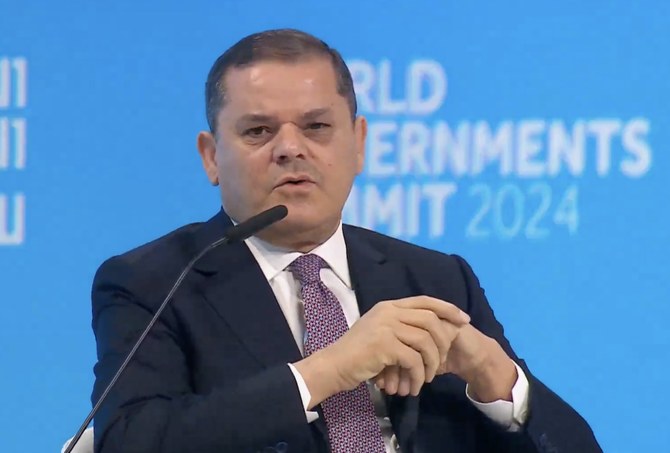
LONDON: Libya’s interim prime minister on Wednesday said he expected to be the last head of a transitional government in the country and that political and economic reforms were beginning to take hold.
Speaking at the World Governments Summit in Dubai, Abdul Hamid Dbeibah told delegates that he “wanted oxygen to return to the body of Libya,” and that the rebuild of the country was moving forward at pace.
“We have worked to restructure education, infrastructure, energy, and health. For nearly 10 years, the electricity in Libya was constantly cut off, but we made great efforts to solve this problem and now, it has not been cut off for a single minute for a year-and-a-half,” the PM added.
The North African nation has remained unstable since the eruption of violence in 2011, the overthrow and death of long-time dictator Muammar Qaddafi, and a subsequent civil war.
Dbeibah has headed the UN-backed, internationally recognized Government of National Unity since 2021 from Tripoli, but faces opposition from the rival, eastern-based Government of National Stability.
He told Kuwaiti presenter Ammar Taqi that the political and economic rebuild of the country was ongoing despite the division and unrest, and he rejected some outside accusations that Libya had become a land of terrorists.
The premier thanked “friendly countries,” including Saudi Arabia, the UAE, and Turkiye, for reopening their embassies and consulates in Tripoli, and urged others to follow suit to assist the rebuilding process, citing the “excellent security conditions” in the capital.
Dbeibah also highlighted the organization of national elections, which Libya’s Speaker of the House of Representatives Aguila Saleh recently said would be “crucial” to resolving the current challenges facing Libya.
Addressing the summit, Dbeibah said: “We announce that we will be the last transitional government, God willing. We want fair laws that are not tailored for any group, and we will be the first government to hand over to whomever the new parliament chooses and whoever it chooses as president of the country.”
He also reaffirmed on Wednesday a decision he made last year to end fuel subsidies in Libya by the middle or end of this year and to offer direct cash support to citizens instead. He recently described the subsidies as “a drain on the state budget,” and pointed out at the WGS that as much as 40 percent of the national budget was being spent on them.
He noted that, since the discovery of oil in Libya, fuel support to citizens had been provided with a liter of gasoline in Libya currently costing three cents. However, he added that as much as 60 percent of the fuel produced in Libya was being smuggled out of the country, costing its economy billions of dollars in losses.
Dbeibah said the success of the policy depended on convincing Libyans they would be better off without subsidies and ensuring their salaries were improved.
“We decided, in fact, to replace fuel subsidies by paying this support directly into the pockets of Libyans,” he added.











